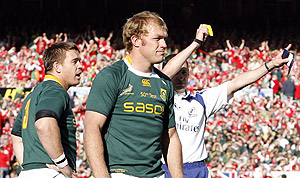
South Africa's Schalk Burger, center, is sin-binned during their international rugby union match against the British Lions at Loftus Versfeld stadium, Pretoria, South Africa, Saturday, June 27, 2009. AP Photo/Paul Thomas
The cranky Brian Moore, former England hooker, now a lawyer and an excellent rabble-rousing sports columnist for The Daily Telegraph UK, has put the boot into the assistant referee Bryce Lawrence over the Schalk Burger affair. The boot has missed its proper target.
“The man that has cost the Lions dear, in not one, but both Test games, is Bryce Lawrence, of New Zealand … If Lawrence, as touch judge, is incapable of linking the vileness of an act occurring two feet away and the proper sanction of a red card, he is not fit to officiate.”
Let’s leave aside Moore’s apparent attempt to make this out to be a perfidious Southern Hemisphere conspiracy to kill off the series challenge to South Africa by the British and Irish Lions. The fact is, on every rational ground, Moore is just plain wrong.
Bryce Lawrence was right in the way he handled the Shalk Burger incident.
The guilty parties, aside from perpretator Burger and the Springboks coach, the flaky Peter de Villiers who tried to justify the unjustifiable, are the referee Cristohe Berdos, a Frenchman, and Alan Hudson, the Canadian, who as the IRB’s judicial officer, gave Burger a risible eight weeks for his eye-gouging of Luke Fitzgerald.
The main point to make in the defence of Lawrence is that he was the assistant referee, not the referee of the Test. Assistant referees, as their title suggests, are there to assist the referee to make correct decisions on infringements of the laws.
The match referee makes the final decision. He can over-rule the assistant referee, and sometimes does.
It is noticeable on occasions, too, that the referee will pre-empt what he thinks an assistant referee will advise if he thinks the assistant might have got it wrong.
The point is the match referee makes the final decision.
Now let’s go to the incident to see how these parameters played themselves out.
The eye-gouging started in a ruck and became evident to the assistant referee Lawrence (but not to the referee Bertos) as the players rolled away from the melee.
Lawrence alerted Berdos to the fact that a serious infringement had occurred. So far, so good.
Now we come to an issue that hasn’t received much attention: how accurate is the understanding of English by the Frenchman Berdos.
In the first Tes,t Berdos, in his capacity as the video referee, had trouble communicating with the match referee Lawrence over a possible try. Later in the second Test, too, Lawrence had trouble communicating to Berdos what he should really have been asking the video referee, Stu Dickinson, in relation to Jacque Fourie’s try.
But back to the incident.
Lawrence goes across to Berdos and tells him about the eye-gouging and says it warrants “a yellow card, at least.”
Moore and others are critical of Lawrence that he did not recommend a red card. But if Lawrence had done this, he would have effectively taken the decision from Berdos and given it to himself.
His choice of words invited Berdos to ask the obvious question, which would then have given him the decision to give Burger a red card.
That question from Berdos should have been something like: “You say, at least a yellow card: what about a red card?”
Lawrence presumably then would have said that it was eye-gouging and that this is an offence that can and should carry a red card sanction. You’d then expect Berdos, after an exchange like this, to give Burger a red card, which was the appropriate punishment.
Unfortunately, Berdos, whether because he didn’t fully understand the obvious choice Lawrence was offering or through not understanding the laws (a fault he revealed as a video referee), gave the inadequate yellow card.
And a furore has exploded unfairly around Lawrence who, in fact, is one of the few officials to get it right during this affair.
South Africa is appealing the two-week ban on Bakkies Botha, which raises the issue of who is going to appeal the eight-week ban on Burger.
There is no doubt that Burger has been given a totally inadequate punishment.
He is a former IRB Player of the Year and what he did has brought rugby into great disrepute. His case should be reviewed with a view to increasing his punishment to a much longer ban.





























































































